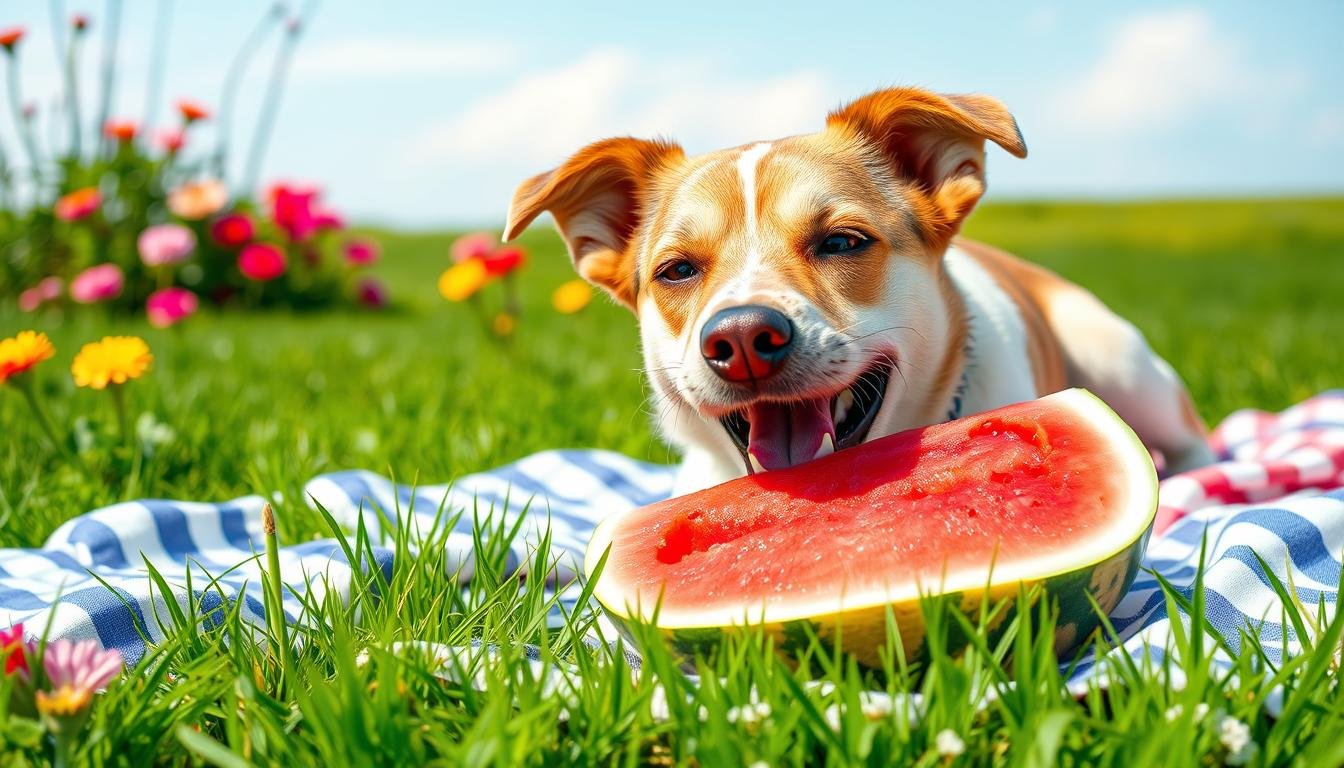As a dog owner, I often wonder if my furry friend can enjoy watermelon. The answer is yes, but with some guidelines. Since 78% of dog owners believe that feeding fruits like watermelon is safe for their pets1. Watermelon is 92% water, making it a great way to hydrate your dog1.
But, it’s crucial to remove the rind and all seeds. They can cause intestinal blockage. Only 50% of veterinary professionals recommend watermelon as a safe fruit for dogs, provided it is seedless and served in moderation1.
When considering can dogs eat watermelon, it’s essential to think about watermelon for dogs and the impact on dog health. With 90% of dog owners who introduce fruits like watermelon reporting no adverse reactions in their pets after monitoring their response1, it’s clear that watermelon can be a safe and healthy treat for dogs.
Key Takeaways
- Watermelon is 92% water, making it an excellent form of hydration for dogs1.
- Remove the rind and all seeds before serving watermelon to your dog to avoid intestinal blockage.
- Only 50% of veterinary professionals recommend watermelon as a safe fruit for dogs, provided it is seedless and served in moderation1.
- 90% of dog owners who introduce fruits like watermelon report no adverse reactions in their pets after monitoring their response1.
- Can dogs eat watermelon safely, and the answer is yes, but with guidelines, as it’s a great option for watermelon for dogs and dog health.
- It’s crucial to consider the potential risks and benefits of feeding watermelon to your dog, including digestive issues like gas, diarrhea, or vomiting that can affect up to 30% of dogs that consume fruits outside their regular diet1.
The Quick Answer About Dogs and Watermelon
Watermelon is safe for dogs2. But, it’s important to remove the seeds and rind to keep them healthy2. Watermelon is mostly water, making it a great way to keep dogs hydrated3.
Watermelon has vitamins A, B6, and C, which help dogs’ immune systems and coats3. It’s also very low in calories and has no fat or cholesterol3. Just give dogs a few bites a day to keep things balanced3.
- Remove seeds and rind to avoid health issues2
- Watermelon is low in calories and rich in water3
- Serve in moderation, about 2 bites per day3
By following these tips, you can safely give dogs watermelon23. It’s a nutritious and hydrating treat for them23.
Benefits of Watermelon for Dogs
As a dog owner, it’s key to give your pet a balanced diet with healthy treats like watermelon. Watermelon is great for hydrating your dog since it’s 92% water4. This makes it a perfect snack for hot summer days.
Watermelon also packs vitamins A and C, and potassium, which are good for dogs5. These nutrients boost your dog’s immune system and skin health. Plus, watermelon is low in calories, making it a guilt-free snack for dogs watching their weight5.
Some of the main benefits of watermelon for dogs include:
- Hydration: Watermelon is about 92% water, making it a great hydrating snack for dogs4.
- Nutrition: It’s rich in vitamins A and C, and potassium, making it a nutritious choice for dogs5.
- Low calorie count: Watermelon is low in calories, making it a guilt-free snack for dogs watching their weight5.
Can Dogs Eat Watermelon Safely?
Feeding watermelon to dogs can be safe if done right. Watermelon is nutritious and hydrating for them. But, it’s important to remove the rind and seeds first. These can cause health problems like intestinal blockage6.
Watermelon is mostly water, about 92%. This makes it a low-calorie, hydrating snack for dogs6.
Parts to Avoid
Some parts of watermelon are not good for dogs. The rind and seeds can block their intestines or cause other health issues6. It’s also key to not overfeed your dog.
Potential Choking Hazards
Dogs can choke on watermelon chunks or seeds. So, cut the fruit into small pieces. For small dogs, give 1-3 small cubes as an occasional treat6.
By following these tips, your dog can safely enjoy watermelon. Always think about can dogs eat watermelon safely and watermelon safety for dogs when adding new foods7.
Signs Your Dog Might Be Allergic to Watermelon
As a dog owner, knowing the signs of a watermelon allergy is crucial. Watermelon is usually safe for dogs, but some may react. Look out for signs like ear infections, constant scratching, or skin lesions4. If your dog shows these symptoms after eating watermelon, see your vet right away.
Dogs don’t need fruits or veggies in their diet, and they shouldn’t make up more than 10% of their daily calories4. Watermelon, being mostly water, can be a refreshing treat. But, make sure to remove the rind and seeds to avoid blockages4. Common allergy signs include ear infections, scratching, and skin issues, which can show up at any age4.
Some key signs to look out for include:
- Frequent ear infections
- Constant scratching of itchy skin
- Lesions on the skin
If you think your dog is allergic to watermelon, get vet advice. This ensures your dog gets the right care4.
How to Prepare Watermelon for Your Dog
Preparing watermelon for your dog is easy. Just follow a few steps to keep them safe. According to8, remove the rind and seeds. They can block intestines or cause health problems.
Start with a fresh, ripe watermelon. Wash it well under running water. Then, cut it into small pieces to prevent choking. Use a melon baller for fun, bite-sized balls.
Make sure to remove seeds and rind. This is key to watermelon preparation for dogs. It ensures they can enjoy this tasty treat safely.
Store cut watermelon in an airtight container in the fridge for up to 24 hours. Freezing it makes it last longer and is a fun snack. Watermelon is low in calories but rich in vitamins and minerals5.
Remember to use clean cutting tools and avoid cross-contamination. You can mix in plain yogurt or honey for extra nutrition9. These steps help your dog enjoy watermelon safely and healthily.
Creative Ways to Serve Watermelon to Your Pup
As a dog owner, you want to give your furry friend a cool and healthy treat. Watermelon is perfect for this, being full of water and vitamins A and C. It’s also low in calories, making it a great creative way to serve watermelon to dogs5. You can freeze it or mix it into your dog’s favorite treats.
There are many fun ways to serve watermelon to your dog. You can make watermelon pupsicles or add it to yogurt. Or, try a watermelon and peanut butter popsicle for a tasty snack9. Just remember to remove the seeds and rind to avoid choking hazards4.
Here are some tips for serving watermelon to your dog:
- Use a cookie cutter to cut out fun shapes from the watermelon
- Add a sprinkle of dog-safe granola or yogurt on top of the watermelon
- Try making a watermelon and banana smoothie for a refreshing treat

Always talk to your vet before trying new foods or treats, even if they seem safe4. With a bit of creativity, you can give your dog a yummy and healthy snack they’ll enjoy.
| Treat | Ingredients | Servings |
|---|---|---|
| Watermelon Pupsicles | 2 cups watermelon, ¼ cup plain yogurt | 6-8 |
| Peanut Butter and Banana Popsicle | ½ cup peanut butter, 1 banana | 8 |
When to Avoid Giving Your Dog Watermelon
As a dog owner, knowing when to avoid watermelon is key for your pet’s health. Watermelon can be a tasty treat, but there are times it’s not safe. Dogs with diabetes or kidney disease should avoid it because of its sugar1.
Puppies and senior dogs also need special care with watermelon. It can cause stomach problems if they eat the seeds or rind10. About 10-20% of dogs might get blockages from eating it wrong10.
It’s important to think about your dog’s health before giving them watermelon. Dogs with weight issues or stomach problems might not be able to handle it. Treats should only make up 10% of their daily calories to avoid too much food11.
Here are some reasons to avoid watermelon for your dog:
- Medical conditions, like diabetes or kidney disease1
- Age, such as puppies or senior dogs10
- Weight management or stomach issues11
Knowing these factors helps keep your dog safe and healthy with watermelon. Always talk to your vet about your dog’s diet and health1.
| Medical Condition | Watermelon Intake Recommendation |
|---|---|
| Diabetes | Avoid or limit watermelon intake due to high sugar content1 |
| Kidney Disease | Avoid or limit watermelon intake due to high sugar content1 |
My Experience Feeding Watermelon to Different Dog Breeds
As a dog owner, I’ve fed watermelon to various dog breeds. I’ve seen that some breeds love it more than others. It’s key to think about each breed’s special needs when giving them watermelon. For example, smaller breeds might need smaller amounts to avoid stomach problems12. Larger breeds can usually handle bigger portions as treats.
Every dog is unique, and what works for one might not work for another. Some dogs might have allergies or sensitivities to watermelon. Always watch your dog’s behavior and health after introducing watermelon. If they show signs of illness, like vomiting or diarrhea, talk to a vet13.
Watermelon is also good for dogs because it’s full of nutrients. But, make sure to remove seeds and rinds first. They can be harmful or cause stomach problems12. By being careful, you can make sure your dog enjoys watermelon safely and healthily.

In summary, my experience with feeding watermelon to different dog breeds has been good. But, it’s important to be careful and considerate. By knowing your dog’s breed and taking the right steps, you can make sure they have a fun and safe time eating watermelon13.
Common Mistakes to Avoid When Feeding Watermelon
Feeding watermelon to dogs can be tricky. It’s important to avoid mistakes that could harm their health. One big mistake is not controlling the amount you give, which can lead to health problems14. Watermelon is mostly water, making it great for keeping dogs hydrated14. But, the seeds can be a choking hazard if not taken out14.
To keep your dog safe, follow the right serving sizes and remove seeds and rind. Here are some mistakes to steer clear of:
- Overfeeding: Stick to the recommended serving size to prevent overfeeding your dog.
- Not removing seeds and rind: These can cause blockages or health issues, so take them out before serving.
Knowing these mistakes can help make sure your dog enjoys watermelon safely. Always check the serving sizes and remove seeds and rind to avoid problems14.
| Mistake | Consequence |
|---|---|
| Overfeeding | Health issues, such as obesity and digestive problems |
| Not removing seeds and rind | Intestinal blockage or other health problems |
Other Summer Fruits Safe for Dogs
Looking for dog-safe summer fruits? There’s more than just watermelon15. Cantaloupe, honeydew, and peaches are all good for dogs. They provide hydration and important vitamins and minerals.
Not all fruits are safe for dogs. Grapes and raisins are toxic16. But, strawberries, blueberries, and bananas are safe and tasty for them17.
Here are some dog-safe summer fruits to try:
- Cantaloupe
- Honeydew
- Peaches
- Strawberries
- Blueberries
- Bananas
Always take out seeds, pits, and rinds before giving fruits to your dog. They can choke or be toxic16.

In conclusion, there are many safe summer fruits for dogs. By picking the right ones and preparing them right, you can give your dog a healthy treat15.
| Fruit | Safety | Preparation |
|---|---|---|
| Cantaloupe | Safe | Remove seeds and rind |
| Honeydew | Safe | Remove seeds and rind |
| Peaches | Safe | Remove pit |
| Grapes | Toxic | Avoid |
Best Times to Give Your Dog Watermelon
Timing is key when giving watermelon to your dog. It’s best as a treat or snack, not a meal replacement. Serve it on hot summer days or after exercise to help with hydration and electrolyte balance5. The right time depends on your dog’s age, health, and how active they are.
Think about your dog’s needs to decide when to give watermelon. Puppies and older dogs might need it more often, in smaller amounts. Active dogs might need more to keep their energy up4. Remember, watermelon should only make up 10% of their daily calories to keep them healthy4.
Here are some important things to keep in mind:
- Don’t give watermelon to dogs with kidney disease or diabetes4.
- Watch for any allergic reactions or digestive problems4.
- Use plain, seedless, and rind-free watermelon to avoid choking hazards or blockages5.
By following these tips and considering your dog’s needs, you can enjoy watermelon together safely5.
| Age Group | Watermelon Serving Size | Frequency |
|---|---|---|
| Puppies (under 1 year) | 1/4 cup | 2-3 times a week |
| Adult dogs (1-7 years) | 1/2 cup | 1-2 times a day |
| Senior dogs (over 7 years) | 1/4 cup | 1-2 times a day |
Conclusion: Making Watermelon a Safe Treat for Your Dog
Watermelon can be a great treat for dogs if done right. By following the tips in this article, you can make sure your dog gets the good stuff from watermelon. This way, they can enjoy its hydrating18and nutritious19parts without any harm.
But remember, only give watermelon in small amounts. Aim for 1-2 ounces for every 10 pounds of your dog’s weight18. Also, watch out for seeds18 and rind18 to avoid choking and digestive problems. With a bit of caution, watermelon can be a tasty and healthy summer snack for both you and your dog.
As dog owners, we want our pets to be happy and healthy. Watermelon can be a fun and light snack18 that might even help with weight management. So, feel free to give your dog a piece of watermelon. Just make sure to follow the advice in this guide18.

